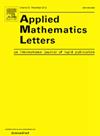Adaptive-coefficient finite difference frequency domain method for time fractional diffusive-viscous wave equation arising in geophysics
IF 2.9
2区 数学
Q1 MATHEMATICS, APPLIED
引用次数: 0
Abstract
The diffusive-viscous wave (DVW) equation is a widely used model to describe frequency dependent attenuation of seismic wave in fluid-saturated porous medium. In this paper taking power law frequency dependent attenuation into account, we first introduce a modified DVW equation (time fractional DVW equation) in which the first order temporal derivative of viscous term is replaced with a fractional order temporal derivative. In consideration of that most of the existing numerical simulations for seismic wave equations are based on time domain methods and truncation with some specific boundary conditions, we incorporate the absorbing boundary condition as complex-frequency-shifted (CFS) perfectly matched layer (PML) into the time fractional DVW equation, and then develop an adaptive-coefficient (AC) finite difference frequency domain (FDFD) method for numerical simulation. The corresponding analytical solution for homogeneous time fractional DVW equation is provided for model validation, and the effectiveness of the developed AC FDFD method is verified by some numerical examples including the homogeneous model and the layered model. Numerical results show that AC FDFD method is more accurate than the traditional 2nd-order FDFD method for numerical modeling of time fractional DVW equation with CFS PML absorbing boundary condition, while requiring similar computational costs.
地球物理学中出现的时间分数扩散粘性波方程的自适应系数有限差分频域法
扩散粘性波(DVW)方程是描述地震波在流体饱和多孔介质中频率相关衰减的一个广泛使用的模型。本文考虑到频率相关衰减的幂律,首先引入了修正的 DVW 方程(时间分数 DVW 方程),其中粘性项的一阶时间导数被分数阶时间导数所取代。考虑到现有的地震波方程数值模拟大多基于时域方法和特定边界条件的截断,我们在时间分数 DVW 方程中加入了作为复频移位(CFS)完全匹配层(PML)的吸收边界条件,然后开发了一种自适应系数(AC)有限差分频域(FDFD)方法进行数值模拟。为模型验证提供了均质时间分数 DVW 方程的相应解析解,并通过一些数值示例(包括均质模型和分层模型)验证了所开发的 AC FDFD 方法的有效性。数值结果表明,对于具有 CFS PML 吸收边界条件的时间分数 DVW 方程的数值建模,交流 FDFD 方法比传统的二阶 FDFD 方法更精确,而所需的计算成本相近。
本文章由计算机程序翻译,如有差异,请以英文原文为准。
求助全文
约1分钟内获得全文
求助全文
来源期刊

Applied Mathematics Letters
数学-应用数学
CiteScore
7.70
自引率
5.40%
发文量
347
审稿时长
10 days
期刊介绍:
The purpose of Applied Mathematics Letters is to provide a means of rapid publication for important but brief applied mathematical papers. The brief descriptions of any work involving a novel application or utilization of mathematics, or a development in the methodology of applied mathematics is a potential contribution for this journal. This journal''s focus is on applied mathematics topics based on differential equations and linear algebra. Priority will be given to submissions that are likely to appeal to a wide audience.
 求助内容:
求助内容: 应助结果提醒方式:
应助结果提醒方式:


